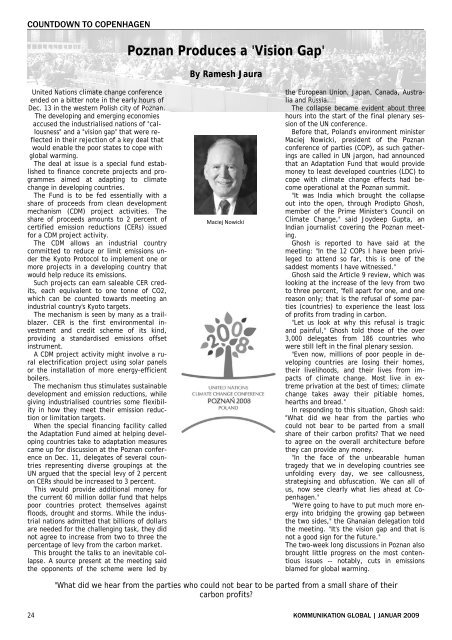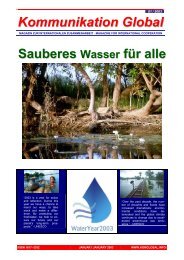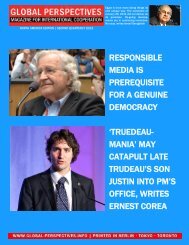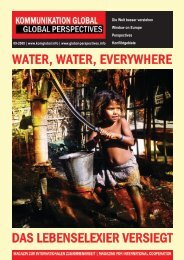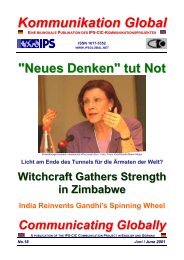GLOBAL PERSPECTIVES | KOMMUNIKATION GLOBAL - 01 | 2009
GLOBAL PERSPECTIVES | KOMMUNIKATION GLOBAL - 01 | 2009
GLOBAL PERSPECTIVES | KOMMUNIKATION GLOBAL - 01 | 2009
Create successful ePaper yourself
Turn your PDF publications into a flip-book with our unique Google optimized e-Paper software.
COUNTDOWN TO COPENHAGEN<br />
United Nations climate change conference<br />
ended on a bitter note in the early hours of<br />
Dec. 13 in the western Polish city of Poznan.<br />
The developing and emerging economies<br />
accused the industrialised nations of "callousness"<br />
and a "vision gap" that were reflected<br />
in their rejection of a key deal that<br />
would enable the poor states to cope with<br />
global warming.<br />
The deal at issue is a special fund established<br />
to finance concrete projects and programmes<br />
aimed at adapting to climate<br />
change in developing countries.<br />
The Fund is to be fed essentially with a<br />
share of proceeds from clean development<br />
mechanism (CDM) project activities. The<br />
share of proceeds amounts to 2 percent of<br />
certified emission reductions (CERs) issued<br />
for a CDM project activity.<br />
The CDM allows an industrial country<br />
committed to reduce or limit emissions under<br />
the Kyoto Protocol to implement one or<br />
more projects in a developing country that<br />
would help reduce its emissions.<br />
Such projects can earn saleable CER credits,<br />
each equivalent to one tonne of CO2,<br />
which can be counted towards meeting an<br />
industrial country's Kyoto targets.<br />
The mechanism is seen by many as a trailblazer.<br />
CER is the first environmental investment<br />
and credit scheme of its kind,<br />
providing a standardised emissions offset<br />
instrument.<br />
A CDM project activity might involve a rural<br />
electrification project using solar panels<br />
or the installation of more energy-efficient<br />
boilers.<br />
The mechanism thus stimulates sustainable<br />
development and emission reductions, while<br />
giving industrialised countries some flexibility<br />
in how they meet their emission reduction<br />
or limitation targets.<br />
When the special financing facility called<br />
the Adaptation Fund aimed at helping developing<br />
countries take to adaptation measures<br />
came up for discussion at the Poznan conference<br />
on Dec. 11, delegates of several countries<br />
representing diverse groupings at the<br />
UN argued that the special levy of 2 percent<br />
on CERs should be increased to 3 percent.<br />
This would provide additional money for<br />
the current 60 million dollar fund that helps<br />
poor countries protect themselves against<br />
floods, drought and storms. While the industrial<br />
nations admitted that billions of dollars<br />
are needed for the challenging task, they did<br />
not agree to increase from two to three the<br />
percentage of levy from the carbon market.<br />
This brought the talks to an inevitable collapse.<br />
A source present at the meeting said<br />
the opponents of the scheme were led by<br />
Poznan Produces a 'Vision Gap'<br />
By Ramesh Jaura<br />
Maciej Nowicki<br />
the European Union, Japan, Canada, Australia<br />
and Russia.<br />
The collapse became evident about three<br />
hours into the start of the final plenary session<br />
of the UN conference.<br />
Before that, Poland's environment minister<br />
Maciej Nowicki, president of the Poznan<br />
conference of parties (COP), as such gatherings<br />
are called in UN jargon, had announced<br />
that an Adaptation Fund that would provide<br />
money to least developed countries (LDC) to<br />
cope with climate change effects had become<br />
operational at the Poznan summit.<br />
"It was India which brought the collapse<br />
out into the open, through Prodipto Ghosh,<br />
member of the Prime Minister's Council on<br />
Climate Change," said Joydeep Gupta, an<br />
Indian journalist covering the Poznan meeting.<br />
Ghosh is reported to have said at the<br />
meeting: "In the 12 COPs I have been privileged<br />
to attend so far, this is one of the<br />
saddest moments I have witnessed."<br />
Ghosh said the Article 9 review, which was<br />
looking at the increase of the levy from two<br />
to three percent, "fell apart for one, and one<br />
reason only; that is the refusal of some parties<br />
(countries) to experience the least loss<br />
of profits from trading in carbon.<br />
"Let us look at why this refusal is tragic<br />
and painful," Ghosh told those of the over<br />
3,000 delegates from 186 countries who<br />
were still left in the final plenary session.<br />
"Even now, millions of poor people in developing<br />
countries are losing their homes,<br />
their livelihoods, and their lives from impacts<br />
of climate change. Most live in extreme<br />
privation at the best of times; climate<br />
change takes away their pitiable homes,<br />
hearths and bread."<br />
In responding to this situation, Ghosh said:<br />
"What did we hear from the parties who<br />
could not bear to be parted from a small<br />
share of their carbon profits? That we need<br />
to agree on the overall architecture before<br />
they can provide any money.<br />
"In the face of the unbearable human<br />
tragedy that we in developing countries see<br />
unfolding every day, we see callousness,<br />
strategising and obfuscation. We can all of<br />
us, now see clearly what lies ahead at Copenhagen."<br />
"We're going to have to put much more energy<br />
into bridging the growing gap between<br />
the two sides," the Ghanaian delegation told<br />
the meeting. "It's the vision gap and that is<br />
not a good sign for the future."<br />
The two-week long discussions in Poznan also<br />
brought little progress on the most contentious<br />
issues -- notably, cuts in emissions<br />
blamed for global warming.<br />
"What did we hear from the parties who could not bear to be parted from a small share of their<br />
carbon profits?<br />
24 <strong>KOMMUNIKATION</strong> <strong>GLOBAL</strong> | JANUAR <strong>2009</strong>


